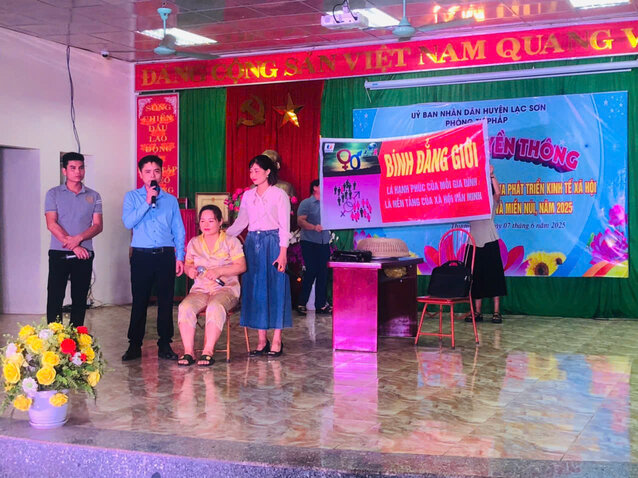The competitions are organized on a moderate but practical scale, closely linked to the daily lives of the people. Instead of formal, dry legal dissemination sessions, the content is conveyed through the form of dramatization, skits, knowledge competitions, situation handling and direct Q&A exchanges.
The topics of the contests were also carefully selected, focusing on issues related to people such as: marriage and family, gender equality, domestic violence, child marriage, traffic safety, land use rights, administrative procedures, etc.

Not only are they a place to learn, the contests have also become a community festival. Many teams are women's youth unions, youth unions, village cadres or even spontaneous groups among the people. In traditional costumes, they confidently demonstrate their understanding of the law through witty, rustic but convincing skits. In particular, hypothetical situations such as: land disputes between brothers, forced marriage, motorbike drivers not wearing helmets... are vividly expressed, making the audience not only laugh but also "shocked" to realize the problem that is happening around them.
Ms. Bui Thi Ha - Head of the Lac Son District Judicial Department said: "We determined that in order for people to understand and comply with the law, the propaganda method must be close, easy to remember, easy to understand. The contests not only test knowledge, but also arouse a sense of responsibility, awareness of living and working according to the law in the community".
In Tu Do commune, where more than 95% of the population is Muong ethnic people, the law competition was held, attracting hundreds of people to watch. Ms. Bui Thi Thiet (73 years old) shared: "I only know that skyrocketing after watching the product is a violation of the law. In the past, in the village, it was common for girls aged 15-16 to get married, now seeing officials talking, I understand, we should not do that anymore".
Not stopping at the competitions, after each program, bilingual legal documents (Vietnamese - Muong language) are distributed to the people. Grassroots judicial officials also took the opportunity to explain new regulations related to land, marriage, voluntary social insurance, etc., thereby increasing the effectiveness of on-site propaganda.
It can be seen that the innovation of legal communication methods in Lac Son has created clear changes in people's awareness and behavior. Many people were previously afraid to approach the law, but now they have proactively researched and asked officials when they needed advice, even becoming propagandists in the community.
The model of the legal knowledge contest in Lac Son not only helps improve legal knowledge for people in the highlands, but also contributes to strengthening the great solidarity bloc, building a civilized and progressive lifestyle in each village. This is an effective direction, worth replicating in localities with a large number of ethnic minorities.










